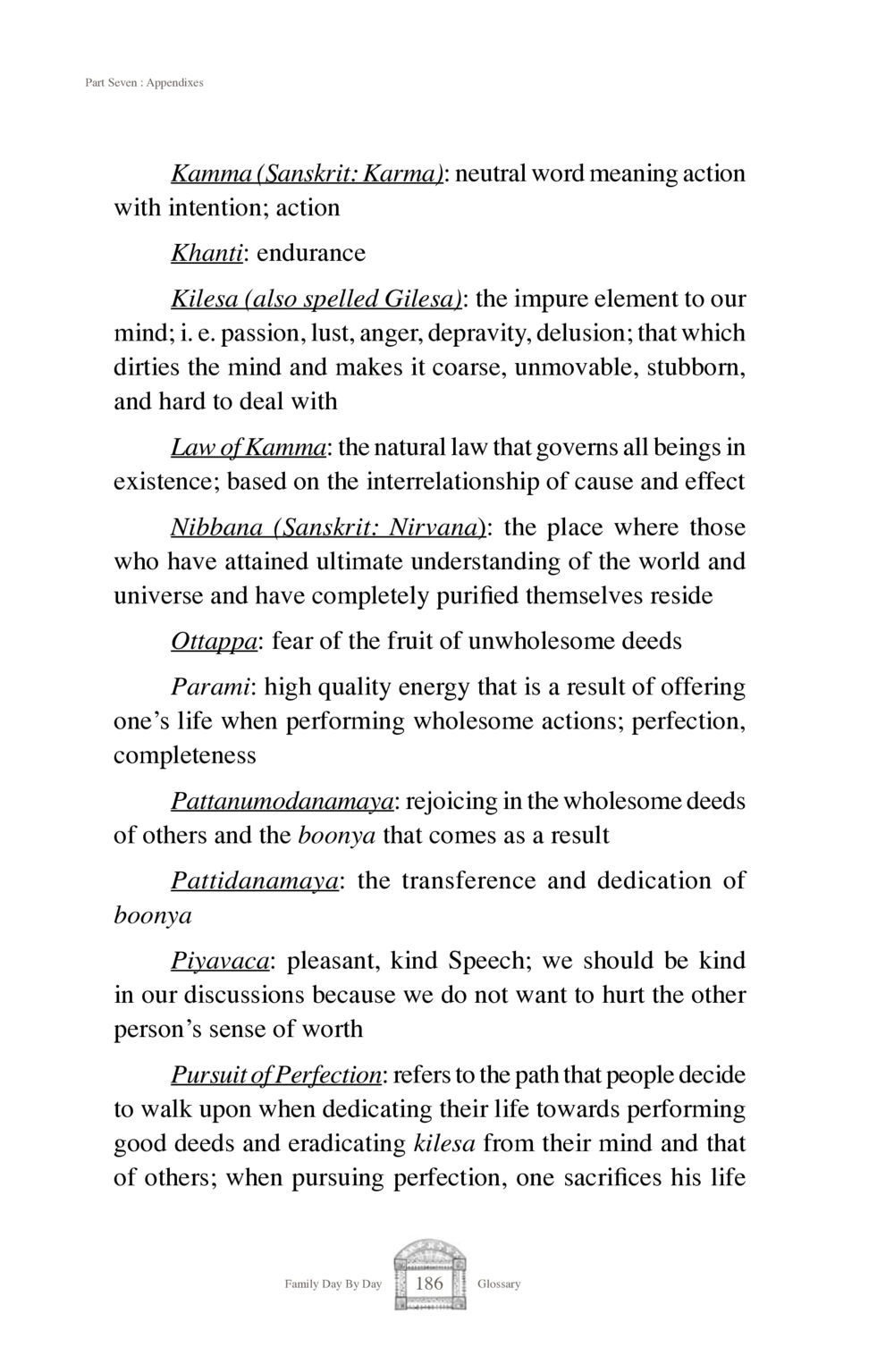Glossary of Buddhist Terms : หน้า 188/216
Family Day By Day : หน้า 188/216 A concise glossary explaining key Buddhist concepts such as Kamma, Nibbana, and Paramis.
0 ครั้ง

สรุปเนื้อหา
This glossary provides definitions for essential Buddhist vocabulary, including terms like Kamma, which refers to actions with intention, and Nibbana, the ultimate state of understanding. It discusses the implications of Kilesa and the importance of wholesome actions in the pursuit of perfection. Each term is explained to aid comprehension of core Buddhist principles without external references. More details can be found at dmc.tv.
หัวข้อประเด็น
-Kamma
-Nibbana
-Kilesa
-Law of Kamma
-Parami
-Pursuit of Perfection
ข้อความต้นฉบับในหน้า
Part Seven: Appendixes
Kamma (Sanskrit: Karma): neutral word meaning action
with intention; action
Khanti: endurance
Kilesa (also spelled Gilesa): the impure element to our
mind; i. e. passion, lust, anger, depravity, delusion; that which
dirties the mind and makes it coarse, unmovable, stubborn,
and hard to deal with
Law of Kamma: the natural law that governs all beings in
existence; based on the interrelationship of cause and effect
Nibbana (Sanskrit: Nirvana): the place where those
who have attained ultimate understanding of the world and
universe and have completely purified themselves reside
Ottappa: fear of the fruit of unwholesome deeds
Parami: high quality energy that is a result of offering
one's life when performing wholesome actions; perfection,
completeness
Pattanumodanamaya: rejoicing in the wholesome deeds
of others and the boonya that comes as a result
Pattidanamaya: the transference and dedication of
boonya
Piyavaca: pleasant, kind Speech; we should be kind
in our discussions because we do not want to hurt the other
person's sense of worth
Pursuit of Perfection: refers to the path that people decide
to walk upon when dedicating their life towards performing
good deeds and eradicating kilesa from their mind and that
of others; when pursuing perfection, one sacrifices his life
Family Day By Day
186
Glossary
หน้าหนังสือทั้งหมด

1

2

3

4

5

6

7

8

9

10

11

12

13

14

15

16

17

18

19

20

21

22

23

24

25

26

27

28

29

30

31

32

33

34

35

36

37

38

39

40

41

42

43

44

45

46

47

48

49

50

51

52

53

54

55

56

57

58

59

60

61

62

63

64

65

66

67

68

69

70

71

72

73

74

75

76

77

78

79

80

81

82

83

84

85

86

87

88

89

90

91

92

93

94

95

96

97

98

99

100

101

102

103

104

105

106

107

108

109

110

111

112

113

114

115

116

117

118

119

120

121

122

123

124

125

126

127

128

129

130

131

132

133

134

135

136

137

138

139

140

141

142

143

144

145

146

147

148

149

150

151

152

153

154

155

156

157

158

159

160

161

162

163

164

165

166

167

168

169

170

171

172

173

174

175

176

177

178

179

180

181

182

183

184

185

186

187

188

189

190

191

192

193

194

195

196

197

198

199

200

201

202

203

204

205

206

207

208

209

210

211

212

213

214

215

216
หนังสือที่เกี่ยวข้อง
Load More
